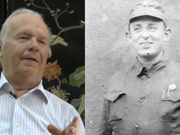Austrian Jewish doctor Jakob Rosenfeld

 0 Comment(s)
0 Comment(s) Print
Print E-mail CNTV, December 12, 2015
E-mail CNTV, December 12, 2015
During World War II, nearly 30 thousand Jewish refugees escaped Nazi persecution by coming to Shanghai. On today's show, during the Jewish holiday Hanukkah, or the Festival of Lights, we tell the story of an Austrian Jewish doctor, Jakob Rosenfeld, who helped China in the War of Resistance Against Japanese Aggression.
Rosenfeld -- a Jew raised near Wiener Neustadt, south of the Austrian capital -- graduated in medicine with a specialization in urology from Vienna University. After Germany invaded Austria in 1938, Rosenfeld was deported to the Dachau concentration camp. In 1939, he was released but had to leave the country within two weeks.
Since China did not require Jews to apply for a visa, he fled to the Shanghai ghetto. Rosenfeld then opened a clinic in Shanghai, and got acquainted with Shen Qizhen -- an official in charge of health affairs in the CPC- led Chinese News fourth Army-- through one of their common friends, Hans Shippe, a reporter from Germany.
Kaminsky, Vice Chairman of Austrian-Chinese Friendship Association said:"Actually he could live very well, even a luxurious live in China. But he was ready to give up everything."
As the anti-Japanese war intensified, the Kuomintang brazenly fabricated the Southern Anhui Incident in 1941 to attack the Chinese New Fourth Army, which made Rosenfeld very angry.
"His friends, like Shen Qizhen, they told him that you can’t bear those hardships, it is very difficult to live with the New fourth Army together, but he said I don’t care, I have experienced in the concentration camp, I can endure any kind of hardships, and these are the reasons why he joined the New Fourth Army, he (showed) sympathy and compassion for Chinese people," said Kaminsky.
Rosenfeld then left Shanghai for Northern China. From 1941, he worked as a field doctor in the New Fourth Army, the Eighth Route Army and the Northeast People's Liberation Army during the war of Resistance against the Japanese Aggression, and the Chinese Civil war in Shandong and Jiangsu provinces.
Rosenfeld conducted a large number of surgical operations for the many wounded soldiers. Sometimes he had to do dozens of surgeries in one day. His working conditions were obviously very poor at the time, and often performed surgery on a small boat. But he didn't complain about such matters.
"Of course there was also the language barrier, but he had learned enough Chinese to ask the patients where they ache. And he often used one sentence “Kuai Yao Hao Le” (which means it would be better soon), so he can console the patients."
Rosenfeld also trained some local medical staff when he had free time. He opened a health school, in which he also compiled textbooks, delivered medical lectures, and made instructional aids.
The new life completed changed the Austrian. He didn’t wear suits or leather shoes any more. Bread and milk were also rare luxuries for him.
Wang Minwei, son of Wang Yutian, the Health Minister in Shandong said:"Like us Chinese, he also slept on a traditional heatable brick bed in the countryside of Shandong province, and daily food for him was usually a traditional Shandong pancake, which is normally very hard to bite and eat. Due to the shortages of food then, the wheat bran was mixed in pancakes, but he didn’t show any antipathy towards it, instead he told others that it tasted really good. "
After victory of the war of resistance against the Japanese aggression, Rosenfeld was sent to Northeast China, as a health minister in the Northeast Field Army.
He chose to remain in China after the fall of the Nazi regime and participated in the People's Liberation Army's march on Beijing, before returning to Europe with his sister in 1949 in search of relatives, most of whom had perished in the Holocaust.
"He had just a small suitcase when he left China. His Chinese assistants said all he brought to Austria were army uniforms from the New Fourth Army, and some personal things," said Wang.
In 1950, after unsuccessfully attempting to return to China, he emigrated to Israel and was reunited with his brother. He died two years later after suffering heart failure. One-fifth of his lifetime was spent in China.
China has also erected a statue in his honor, while a hospital in Junan County of Shandong province was named after him. Meanwhile, a bronze memorial at the entrance of Unfallkrankenhaus (UKH) hospital in Graz, Austria depicts Rosenfeld -- it says: "in memory of the great doctor and humanist in China, Jakob Rosenfeld".






Go to Forum >>0 Comment(s)